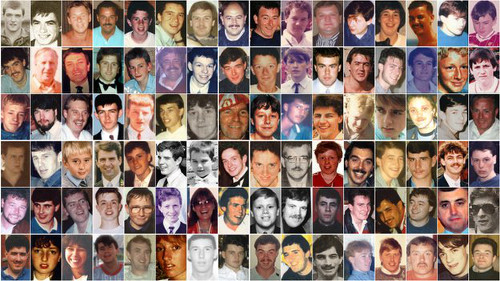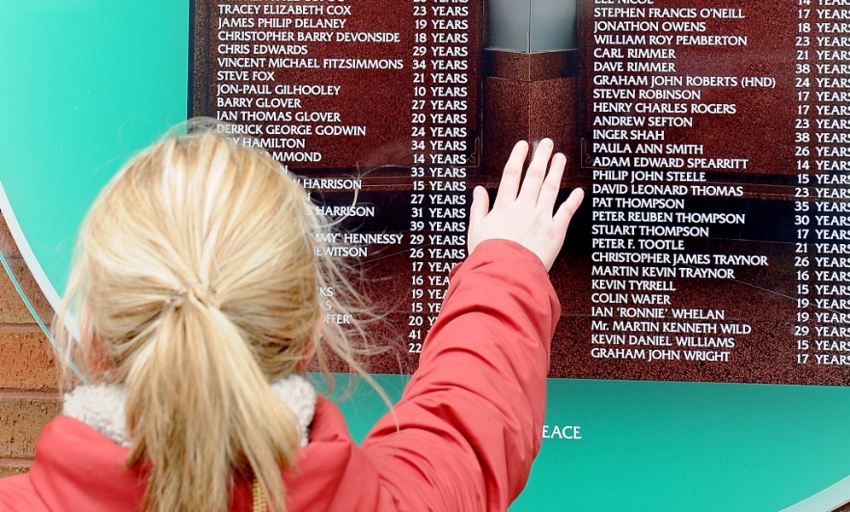Hillsborough inquests - December 3
The Hillsborough inquests commenced on March 31, 2014 and are the subject of reporting restrictions that have been imposed by the Attorney General's office. Liverpool Football Club is respectful of these restrictions and will therefore only be making available updates from other media channels for the duration of the inquest.

The report below - and the witness testimony contained within it - does not necessarily reflect the views of Liverpool FC. Please be aware that the reports on these pages will contain evidence about the day of the disaster which may be distressing.
To view archive reports from each day of the inquest hearings, click here.
Courtesy of the Liverpool Echo - December 3
Moving a Hillsborough victim to the other end of the pitch in between CPR attempts may have affected his chance of survival, the inquests into the 96 deaths heard.
The court heard Andrew Brookes, 26, from Bromsgrove in Worcestershire, was carried from the Leppings Lane terrace onto the pitch at 3.27pm after the crush at the FA Cup semi-final on April 15, 1989.
He was given CPR, lasting about a minute, by PC Christopher Plumridge and ambulanceman Leslie Worrall at the Leppings Lane end of the pitch before being carried on a hoarding to the Kop end.
There he was given more CPR and fan Brian Johnston described seeing Andrew’s eyes flickering and chest moving and feeling a faint pulse.
But the court heard others involved in trying to revive Andrew did not record seeing any signs of life.
Andrew was later confirmed dead in the gymnasium.
Intensive care expert Dr Jasmeet Soar said it was plausible that a more sustained CPR effort at the Leppings Lane end of the pitch, before Andrew was moved to the Kop end, may have meant a different outcome for him.
He said: “Having a longer period of CPR at the Leppings Lane end may have led to, you know, transient signs of life.”
He added: “Early, longer CPR improves the chances of survival.
“Whether having that gap would have made a difference is difficult to say.”
He said it was plausible that Mr Johnston may have felt a pulse when Andrew was at the Kop end of the ground.
But he said he believed Andrew was dead by the time CPR finished at about 3.38pm.
He said: “You can get signs of life during CPR so it is plausible.
“But it doesn’t necessarily mean the individual having the CPR had a sustained, spontaneous heartbeat.
“It could have either been short lived or caused by the chest compressions.
“So the fact that CPR continued during that time, and it wasn’t sustained, tells me that over that period it is more than likely, when they finished, his heart wasn’t beating and his breathing had stopped.”
The court heard Andrew appeared alive on photos at 3.03pm, three minutes before the match was stopped.
The jury was told evidence suggested that Joseph Clark, a 29-year-old dad from Kirkby, was still alive at 3.06pm.
His friend David Roberts, who managed to escape the crush in the pen, described Joseph shouting “get me out” to him at about that time.
Video evidence showed Joseph in a pile of casualties at the front of pen three at 3.19pm.
He was carried through a gap in the fence at 3.26pm.
He was later carried to the gym and confirmed dead at 3.55pm.
Intensive care expert Professor Jerry Nolan said: “We haven’t had any clearly documented formal assessment of his condition and we have not had, if you like, a trial of CPR to see whether he would respond to that.
“So with neither of those things present, I think it is very difficult to be absolutely certain about his condition, really, right up until the time of confirmation of death by Dr Redgrave.”
The court heard 21-year-old Peter Tootle, from Everton, was separated from friend Colin Frodsham in the crush.
Mr Frodsham, who passed out in the pen, said when he came round he saw Peter lying on the floor with a police officer who appeared to be trying to give him the kiss of life.
The jury was told Peter was carried out of the pen at about 3.34pm and taken to the Kop end, where police constable John Friend said he checked for a pulse in his wrist but could not find one.
He took him to the gymnasium where he was confirmed dead at 3.54pm.
Dr Soar said a pulse check in Peter’s wrist would be unreliable.
He said: “Pulses are difficult to feel. They are even more difficult to feel when they are further away from the heart.
“So a wrist pulse is quite a long way from the heart. So if there was a weak pulse, it may be missed.”
Footage appeared to show a Hillsborough victim’s arm moving while he was in a pile of casualties - but an expert said he was likely to be unconscious at the time.
Dad-of-two Alan McGlone, 28, from Kirkby, went to the match with friends including Joseph Clark, who also died.
The inquests into the 96 deaths were shown footage of Alan in a pile of casualties at 3.19pm.
His arm appeared to be moving in the footage, but intensive care expert Professor Jerry Nolan said he thought it was moved by a man in front of Alan, who was trying to climb out of the pen.
He said: “If that arm is in fact Alan’s arm we can see that his arm is moving from time to time, but I’ve looked very closely at this, and it is always with this person trying to get out of the pen there, he’s just catching his arm.”
Brenda Campbell, representing the family, said Alan’s hand appeared to close around the ankle of the man in front as he tried to climb the fence.
But Prof Nolan said he thought the fingers had stretched as they were caught on the leg of the man and then sprang back into place.
He said: “I could not see, convincingly, any spontaneous movement of that individual.”
Footage from 3.27pm showed Alan lying on the pitch and St John Ambulance volunteer Fred Cox placing his jumper over his face.
Alan was later carried to the gymnasium on a hoarding by police officers Simon Lally and Charles Wilmott, who said they checked him for vital signs but found none.
Prof Nolan said: “It may well be that they are entirely correct and that there were no vital signs and that Alan was dead at that point, but I can’t be confident.
“The reason I say that is that these are not healthcare professionals, they are not experienced in assessing vital signs.
“For that reason, I would be more comfortable leaving that open at that stage and perhaps taking our sort of end time, really, as the time that Dr Byrne makes the formal confirmation - 3.58pm.”



